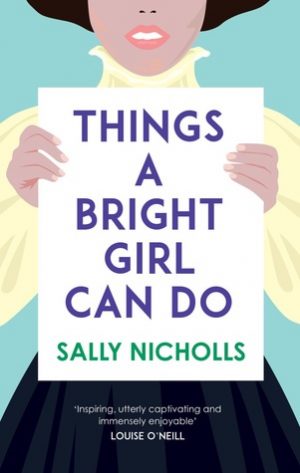‘If you was my wife, I’d take a stick to you.’ When 17-year-old Evelyn witnesses a suffragette being jeered at and pelted with missiles, it sparks a pledge of solidarity with the Women’s Suffrage Movement. Her contemporaries, Nell and May, have different stories to tell but all three girls are raging at the confines of their metaphorical cages. Set in Edwardian London, where women’s lives revolved around home and hearth, Things a Bright Girl Can Do follows their personal quests to live by the motto Deeds not Words.
It’s now a century since the advent of female suffrage in the UK. The women of 1918 were living in turbulent times, both socially and politically, and Sally Nicholls’ engrossing book looks at the Suffragettes’ lives within the context of the First World War and its devastating repercussions.
Evelyn, May, and Nell come from very different stratas of society. Clever, bookish Evelyn longs to study Classics at Oxford, but is stifled by her family’s opposition. May, is like ‘brandy on a cold day,’ glowing with idealistic fervour, and waving the flag for feminism and free-thinking. Cheerfully Sapphic, she becomes romantically entwined with our third, and arguably most complicated character, Nell.
Nell works in a jam factory, to support her impoverished family. She dresses as a male, and numerous other clues imply a trans-gender identity. Nell’s battles to escape the suffocating bonds of gender, sexuality and poverty, lead her to some dark places.
And that’s before World War One lays its dark hand on her shoulder. This is a splendid book. It really conveys the complexities of its time and place in history, and has been excellently researched. There are some startling, fact-based scenes of violence and police brutality, but also the warm blaze of radical thinking, first kisses, and righteous rebellion.
‘Don’t you just feel so alive? Oh, don’t you feel sorry for girls who don’t have any purpose in life?’
Things a Bright Girl Can Do is published by Andersen Press, 432 pages.





